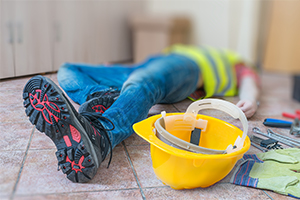Accidents happen every single day, and while there are no statistics that tell us exactly how many accidents happen because someone slipped, tripped or fell on another person’s property, it’s not hard to imagine how common this type of accident can be. Below we’ll explore personal injury claims as a legal recourse for “slip/trip and fall” accidents, outlining what a “slip/trip and fall” case is, when you might have a “slip/trip and fall” case, and who is responsible in a “slip/trip and fall” case.
What is a “Slip/Trip and Fall” Case?
A slip/trip and fall case is potentially triggered when a person sustains an injury from slipping, tripping or falling on someone else’s property where the slip/trip is, at least in part, caused by the condition of the property. Because these cases usually occur on another person’s premises they are considered to be “premises liability” claims, and the person who owns the property where the injured party fell may (but not always) become legally responsible for the injury.
When Do You Have a “Slip/Trip and Fall” Case?
Because injuries can be costly, limiting our ability to work, for example, we may want to seek compensation for things like lost wages that result from an injury. In “slip/trip and fall” cases, there are two important considerations before making a claim: first, there must be someone whose negligence was, at least in part, the reason for your injury; and, you must have injured yourself in some way.
If you hurt yourself on someone else’s property, you might think that the property owner is at fault and that you can sue them for the injuries you sustained – this is the common perception but, it’s not always the case that the property owner is legally responsible for your injuries. If you’re injured and want to make a claim, there needs to be someone – other than yourself – whose negligence was the reason you were injured. If you do something careless to cause your own injury, you can’t make a “slip/trip and fall” claim. But if someone else was negligent, they may be legally responsible, allowing you to make a claim for damages.
Who is Responsible?
Although there is not a clear formula for determining whether someone else is legally responsible for your injuries, there are some guidelines that can help you in this area. Essentially you need to look at the carefulness/carelessness of both yourself and the property owner as it relates to any dangerous conditions that caused the accident.
First, your accident must have been the result of a dangerous condition that the property owner knew or ought to have known about, either because: they created the condition; knew and were negligent in not correcting it; or it existed for a reasonable length of time that they should have known about it. A dangerous condition is one that creates an unreasonable risk and would not have been anticipated by the person who was injured.
Next, the type of property must be considered as there are special considerations for commercial properties, residential properties where a tenant has a “slip/trip and fall” accident, and government properties which have a number of protections in place such shortened notice requirements. Understanding who is legally responsible in each of these scenarios and proving liability can be confusing and complicated and usually requires the support of a lawyer.
Slip and fall cases can be complicated because there is no clear and simple way to prove whether someone is legally responsible for another person’s injuries on their property. Legislation like the Occupiers’ Liability Act can be a starting point, but it does not provide all the answers, especially since each case is unique and depends on the circumstances and type of property. Consulting a lawyer will help you evaluate your case and allow you to make an informed decision about whether or how you should proceed if you are injured in a “slip/trip and fall” accident. You may call one of our personal injury lawyers for free consultation.






